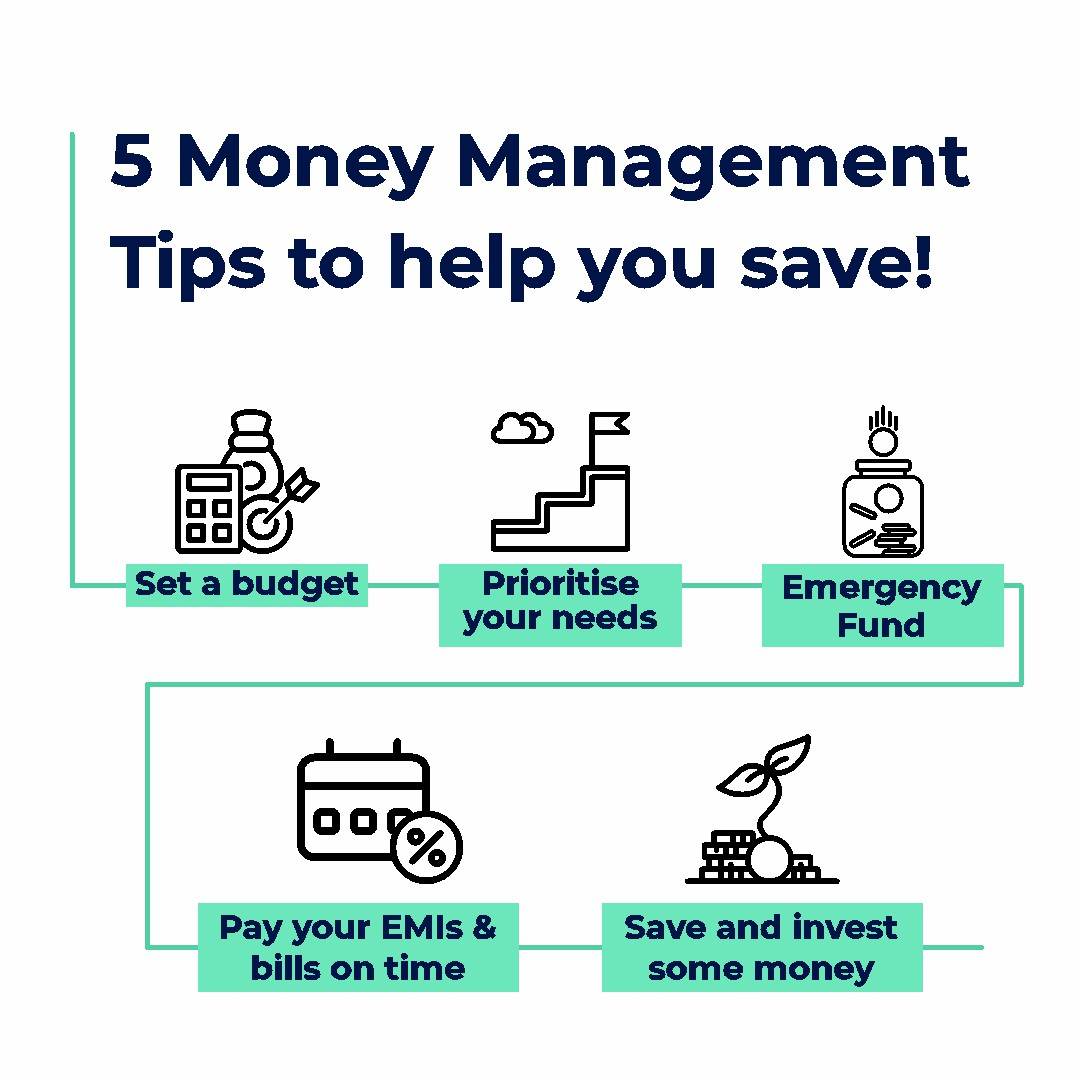Exclusive Money Management Guide To Skyrocket Your Finances
Table of Contents

- jaro education
- 21, August 2024
- 3:00 pm
Introduction
Managing finances might seem like a daunting task. The right mindset and strategies, however, are empowering. These let you take control of your wealth. Moreover, they guide you to a more secure financial future. Explore the seven essential money management tips below. These will improve your finances. You will also achieve your financial goals. Ultimately, you’ll live a more secure financially secure life.
7 Money Management Tips for Financial Success
Let’s have a look at 7 powerful ways how to manage money to improve your finances:

*EduFund
1. Create a Budget and Stick to It
The foundation of money management is crafting a budget. A budget serves as a financial blueprint. It assists in the allocation of one’s income. The focus is on expenses, savings and investments. The establishment of a budget is a key step in money management. The process is necessary for the management of money.
- Track Your Income: You need to begin by tracking all the sources of your income.
- Record Your Expenses: You need to keep a record of every expense. The expenses include fixed costs such as rent or mortgage. They should also cover utilities and groceries. Discretionary spending related to dining out or entertainment should not be forgotten. Defining your financial goals is another key step.
- Define Your Financial Goals: Short-term and long-term financial goals need to be outlined.
- Create a Budget: When it comes to dividing your income, you need to focus on savings necessities and discretionary spending. Ensuring that essential expenses and savings are prioritized is a crucial part. The allocation of money for non-essentials should only come after these priorities.
- Monitor Your Budget: Regular review of the budget is vital. Remember these reviews are to ensure you stay on track. If there are any changes in your financial situation or your goals, then adjustments can be made.
2. Work on Developing Emergency Fund
An emergency fund is integral to employing smart money management tips. Think of it as a financial safe net. The fund can cover unexpected costs which could range from medical bills to unexpected home repairs. Why are emergency funds so vital? They offer financial breathing room. Without it, people can find themselves tapping into high-interest credit options. These ultimately add fuel to the fire. Now let’s look at money management ways to save cash for emergencies.
- Determine a reliable goal: Experts tend to advise saving for six month’s worth of expenditures. But of course, level of income job stability lifestyle and other considerations matter too.
- The magic lies in consistent savings: Put in a small sum every paycheck. Over time these contributions will accumulate.
- Don’t forget direct deposit: This tool can prove extremely useful. Automatically subtract a certain percentage from every paycheck. This will swiftly boost savings.
- Emergency funds are significant: The sole goal is to protect you from unexpected financial curveballs. With careful planning, you can reduce stress in times of financial need.
Reduce and Manage Debt
High debt isn’t just overwhelming, it can limit financial growth. Sometimes we neglect the importance of managing debt. Here’s a concerted money management strategy to ease these woes.
- Pay High-Interest Debts: First, you need to focus on paying off high-interest debts. Credit card debts can spiral quickly. Not having a source of high interest can lessen financial strain. By paying off debts with high interest you can manage a load.
- Snowball Technique: A different method to tackle debt is the debt snowball technique. You start by paying off the smallest debts. It offers a sense of momentum. This way you can find motivation to keep going.
- Consolidating Debt: Another sound approach is consolidating debt. Many smaller debts can merge into one with a lower-interest loan. This money management step can simplify your debt payments. Also, it can reduce the amount of interest you are paying.
- Avoid new Debts: Finally, ensure you avoid acquiring new debt. Think cautiously about what you are spending your money on. Steer clear of taking on new debts. This is particularly important when working on paying down what you owe.
Save and Invest for the Future
Saving and investing are imperative facets of money management. This ensures your financial prospects are safe. How to manage money effectively? Through saving and investing.
- Savings Plan: Form a set plan for saving. Ensure you have goals for both immediate and distant. This might involve buying a home or funding your retirement. Could be providing for your child’s education.
- Utilize Retirement Accounts: Opt for contributions to accounts for retirement. These accounts offer benefits for tax. This essentially aids you in developing a comfortable retirement.
- Diversify Investments: Spread your financial risk by putting money into variable investments. This may also increase returns. It is prudent to consider a portfolio of stocks bonds and other kinds of investment vehicles.
- Seek Expert Financial Advice: Uncertain where to start? Well, seek advice from a finance professional. They can help you formulate objectives specific to your financial situation. Can advise personalized strategies.
Cut Unnecessary Expenses
Improving your finances is simplified by cutting expenditures. This doesn’t demand sacrifices all the time. Being conscious about outgoings can markedly influence your nest egg. Try a few money management ways to slash costs:
- Subscriptions: Check over your subscriptions. Cancel the ones collecting dust such as streaming services gym memberships or magazine subscriptions.
- Home-cooked meals: Frequently dining out can dent your wallet. Opt for homemade cuisine. Not only is it budget-friendly, it’s also good for your health.
- Smart shopping: Scour stores for good deals. Clip coupons. Snag bulk purchases for savings on groceries and essentials.
- Impulse shopping: Stay clear of impulse buys. Draft a shopping list and keep to it. Think before making big purchases. Give yourself time to think. This cooling-off period helps avoid on-the-spot buys.
Improve Your Financial Literacy
Financial Literacy is Key to Money Management. This is a potent way to handle money properly. The more informed you are about personal finance more sound decisions you tend to make financially. Here’s how to up the ante on your financial literacy:
- Read Weights and Pieces: Personal Finance has many books and articles out there. The knowledge you get from them can be nuggets of gold. Make sure you find authors and sources that you trust.
- Participate in Workshops: Consider workshops, or perhaps even seminars. You could try those offered by financial institutions. Or perhaps those organized by community organizations.
Plan for Big Expenses
The importance of planning for big expenses in money management is crucial. It is an unusual concept. Beds’ Unusual concept thus warrants careful guidance. Focus on planning. Examples are a wedding, home renovation or a major purchase. Ignoring planning is imprudent. It holds a potential for finances to be thrown into disarray. Yet with these expenses, this poses less threat. Here’s how to direct funds for the big events.
- Plan Everything: Plan meticulously regardless of the nature. It falls into categories of a wedding a home renovation or extensive purchase. The details are what counts. A habit of estimating costs can go a long way. Anticipate unexpected costs. Adjust your expenditure plan accordingly.
- Anticipate Expenditure: Preparation is the key. Irrespective of the specifics of the expenses, home renovation or others with a detailed plan financial security can be maintained.
- Allocate Your Funds: Allocate the right funds judiciously to minimize risk. Strategic allocation can control financial disturbance.

Effective Money Management: Few More Tips
Effective money management or finance management is a learning process. It is a strategy of patience balanced by prudence on how to manage money. Planning imparts a sense of control over your finances. Yet remember it is okay to seek advice. Plan for big expenses with these considerations and secure the future.
- Set a Budget: Decide how much you can allocate to the significant cost. Then create a budget corresponding to that amount.
- Save in Advance: Begin saving for the major cost sooner rather than later. Avoid having to draw from your emergency stash. It also prevents the accumulation of debt.
- Explore Financing Options: Search for options if the need for financing arises. Scrutinize the choices thoroughly. Pursue low-interest loans. Or choose a financing plan that does not overextend your finances.
- Avoid Impulse Decisions: Be patient when dealing with preparing for the sizable expense. Refrain from making rash decisions. Hastiness could result in over-splurging.
Conclusion
Enhancing your finances via efficient money management is a journey. This journey requires commitment planning, and constant exertion. By adhering to these seven money management tips you can manage future finances. This can decrease tension aiding you in reaching the financial commitments. Memorable is the notion to navigate one’s cash flow consistently. It exhibits a readiness to adapt when financial circumstances expand. Starting to integrate these money management strategies today paves the way to more secure affluent financial prospects.


![Best-IIM-Online-Courses-with-Certification-[2025]](https://jaro-website.s3.ap-south-1.amazonaws.com/2025/04/Best-IIM-Online-Courses-with-Certification-2025-1024x576.webp)








